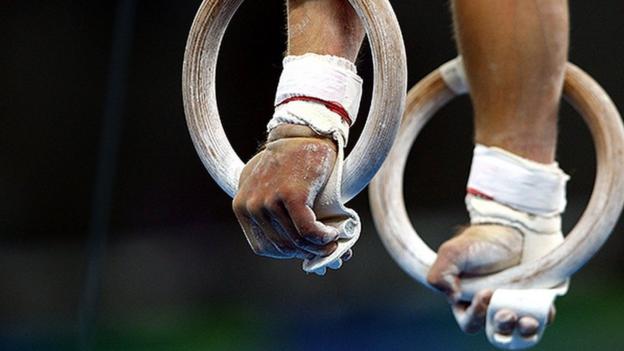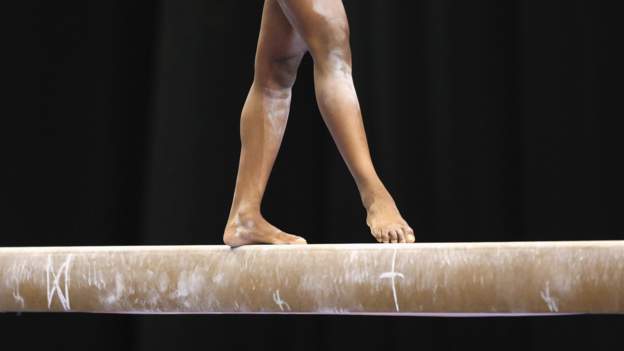
British Gymnastics’ “inept and dysfunctional” system means the “wheels of change are barely turning” a year on from the publication of the damning Whyte Review into abuse in the sport, a campaign group says.
Friday marks 12 months since an independent investigation found issues of physical and emotional abuse within gymnastics in Britain were “systemic”.
At the time, British Gymnastics said it would “not shy away from doing what is needed” – but on the anniversary of the report’s publication, critics say not enough has been done.
To date, only one of the 38 civil cases brought against British Gymnastics has been settled, while a list of banned coaches promised by the governing body has yet to materialise.
“The anniversary of the publication of the Whyte Review serves as a painful reminder to many victims of abuse that they are still living with unresolved cases,” said Gymnasts for Change.
“In the 12 months since publication, despite the rollout of British Gymnastics’ Reform ’25 strategy, too little has been done to engage with survivors and assure whistleblowers and parents that their children are not currently being harmed by participation in the sport.
It added: “To date, British Gymnastics has failed to resolve the numerous civil claims against the organisation, missing significant clues on how to meaningfully reform the sport.”
As recently as May, British Gymnastics chair Mark Darcey admitted the governing body “is ill-equipped to handle these sorts of cases” as it struggled to address the 1,326 concerns raised with its welfare team since 2020.
However at the very top of the sport in Britain, changes that have been implemented are evident, according to Olympian Becky Downie.
Downie, who in 2020 – along with her now-retired sister Ellie – was one of the most high-profile gymnasts to speak out, told BBC Sport she is “seeing much happier athletes” at the elite level.
“I understand a lot more changes need to take place but I also appreciate real change takes time and changing a culture won’t happen overnight,” said the 31-year-old world and European medallist.
“I can confidently say at the top level I’ve personally seen a lot of effort to make changes. We are encouraged to take more ownership of our own performance plans, I’ve seen new coach education programmes being put into practice and I think most importantly I’m seeing much happier athletes.”
In response, British Gymnastics said it “shares the frustration” over the time being taken to resolve complaints, but believes it is making “substantial progress” and “remains on track”.
It said that “significant reform does not happen overnight”, accepting that “we have a lot more work to do and not all change can come quickly enough for everyone”.
It said the “large caseload” of long-standing cases was an “area of great concern”, but with the majority of those going through an independent complaints process it said “timelines therefore are not in our control”.
What did the Whyte Review find?
The Whyte Review was co-commissioned by UK Sport and Sport England in 2020 following allegations of abuse and mistreatment within gymnastics in Britain.
Released on 16 June 2022, it found gymnast wellbeing and welfare “has not been at the centre of British Gymnastics’ culture”.
Athletes were made to train on injuries, punished for needing the toilet, sat on by coaches, shouted and sworn at and had their bags searched for food.
In October 2022, the governing body issued a 40-point action plan called Reform ’25 to make changes in the sport over a two-year period.
As of May, it had completed 11 of the actions, while in the same month it said it had doubled its spending on welfare and safe sport to about £1m a year.
As part of Reform ’25, it pledged to name banned coaches and publish a list of names of those banned on their website. This is yet to happen and no coach has been banned as a result of the Whyte Review.
In June 2022, former elite acrobatic gymnast Eloise Jotischky became the first to win a civil case against British Gymnastics for the abuse she experienced.
Hers is the only one of 38 civil claims brought against British Gymnastics to have been resolved.
Jotischky told BBC Sport: “A year has passed and there is still no sign of coaches, who have allegations against them, being removed from the sport.
“British Gymnastics seems to be alone in allowing accused coaches to work while other sporting bodies implement immediate suspensions and subsequent bans.
“I fear that British Gymnastics is failing to do so as they they are worried about potential litigation from coaches. This is not good enough. Until they are willing to take this step, they are not putting children and victims of abuse at the forefront of their organisation.”
British Gymnastics told BBC Sport the banned list “has been developed and is going to the British Gymnastics Board this month for approval to publish”.
In May, Darcey said national governing bodies have “neither the expertise nor resources” to handle abuse allegations, and that individuals involved in cases “wait too long for justice”.
‘Empty promises’
‘Emma’ spoke to BBC Sport in February 2023, having felt empowered to speak out by the exposure of mistreatment in the sport and the Whyte Review investigation.
Her name changed to protect her identity, Emma was a survivor of historical child sexual abuse by her former trampoline coach, Olympic medal-winning diver Brian Phelps.
Emma has written a letter to Sarah Powell, British Gymnastics chief executive, in which she says Reform ’25 is “empty promises and lies” and alleges a “sense of hostility persists… levelled at survivors who dare to speak out”.
In the letter, seen by BBC Sport, Emma calls into question the “honesty and integrity” at British Gymnastics and whether “some of the poison remains”.
Similarly, Nicole Pavier – one of the first gymnasts to speak to BBC Sport about her experiences of abuse in the sport – said she feels “let down” by British Gymnastics and her trust in the governing body is “very low”.
“One year post-Whyte Review I am angry and frustrated that we are no further forward in redress than we were at the time of publishing,” she told BBC Sport.
Pavier said there had been “little movement” in her case over the last year, adding: “It is becoming increasingly frustrating but also painful to be in a phase where I am constantly reliving the trauma of what happened while remaining very scared that this continues to happen to other athletes and more importantly children.
“It seems that British Gymnastics is prioritising moving forward into the future with complete disregard for addressing past complaints and safeguarding concerns.”
What else has British Gymnastics said?
A statement read: “We know that today will be a tough day for many and want to reiterate our wholehearted apology to the gymnasts who have suffered and recognise again the bravery of those who have spoken out and ultimately driven the change in our sport. It is because of them that the progress we are seeing today is being made and gymnastics is now in a better place than it was before the review.”
“We continue to engage with those who have raised complaints and survivors of abuse to help make the sport better.
“This [Reform ’25] is not a ‘tick-box’ exercise and at its heart are actions to deliver long-term systemic change to reform the sport and create safe, positive and fair experiences for all in gymnastics.”
If you have been affected by issues raised in this article, there is information and support available on BBC Action Line.






More Stories
Kerr’s skill ‘made the boys cry’
Tufnell predicts Australia win on final day of Ashes
No hope of survivors from MRH-90 helicopter crash in Australia